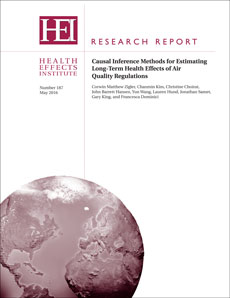You are here
"Direct" Approach Evaluates Air Quality Interventions
 HEI Research Report 187, Causal Inference Methods for Estimating Long-Term Health Effects of Air Quality Regulations, was funded as part of HEI’s Accountability research program, aimed at understanding whether actions to improve air quality have resulted in improved health outcomes. Corwin Zigler and his colleagues used existing and newly developed statistical methods to assess whether an intervention was causally related to changes in pollutant levels or health outcomes, and applied their methods in two well-developed case studies: effects of air quality interventions to reduce PM10 concentrations in nonattainment areas and the impact of installation of scrubber technologies on emissions from coal-fired power plants. Read more about this report in the Spring 2016 Update newsletter.
HEI Research Report 187, Causal Inference Methods for Estimating Long-Term Health Effects of Air Quality Regulations, was funded as part of HEI’s Accountability research program, aimed at understanding whether actions to improve air quality have resulted in improved health outcomes. Corwin Zigler and his colleagues used existing and newly developed statistical methods to assess whether an intervention was causally related to changes in pollutant levels or health outcomes, and applied their methods in two well-developed case studies: effects of air quality interventions to reduce PM10 concentrations in nonattainment areas and the impact of installation of scrubber technologies on emissions from coal-fired power plants. Read more about this report in the Spring 2016 Update newsletter.


